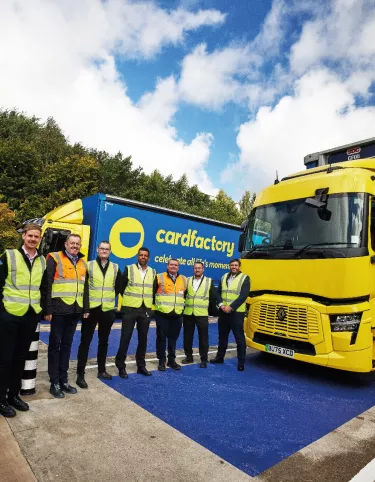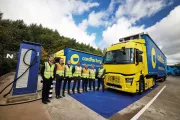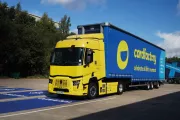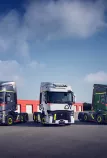Welcome to Renault Trucks UK
Press release
Expect Distribution rolls out first electric HGVs under eFREIGHT 2030 project
#JoinTheGoodMove
Sep. 26 2025

• Bradford-based logistics provider takes delivery of two new Renault Trucks E-Techs to serve Palletline and cardfactory contracts.
Expect Distribution has taken delivery of its first two fully electric heavy goods vehicles as part of the eFREIGHT 2030 project, marking a major step towards its ambition to reach net zero carbon emissions by 2035.
The two vehicles – a Renault Trucks E-Tech T 4x2 tractor unit with sleeper cab and a Renault Trucks E-Tech D Wide rigid with curtainsider body delivered by JDS Truck & Van - are the first fully electric trucks to join Expect Distribution’s fleet of more than 100 HGVs.
Both vehicles are based at the company’s Woodlands distribution hub in Bradford, just off the M62, where Bradford-based Expect Distribution, a national logistics provider, also has two new 240kW chargers, installed by Voltempo, each capable of charging two vehicles simultaneously. The new charging facilities will be used primarily to recharge the trucks overnight, with the potential to make planned charging available to third parties at other times.
One of the vehicles will be used daily to trunk to the Palletline hub in Birmingham, while the second will be deployed on store deliveries for cardfactory across the local region. Together, the trucks are expected to deliver an annual saving of around 195 tonnes of carbon dioxide compared with their diesel counterparts. “These are the very first electric trucks to join our fleet, and we see this as the start of our electrification journey,” said Andy Taylor, Operations Director at Expect Distribution. “The eFREIGHT 2030 project has given us the opportunity to invest in technology that not only reduces our carbon emissions but also to prove that sustainability in logistics can be achieved without unsustainable cost increases.”
Commenting on what this means for their customer, Mr Taylor said: “We’ve worked closely with cardfactory to align this project with their sustainability goals and to optimise routes to ensure we can service their stores effectively and efficiently with the new EVs.”
He added: “As a business we are fully committed to achieving Net Zero by 2035, and we see eFREIGHT 2030 as a key step in helping us, and our customers, deliver on these ambitions. We’ll continue exploring where further electrification is appropriate across all our routes.”
Michael Boxwell, CEO of Voltempo, said: “It’s fantastic to see Expect Distribution deploying their first electric HGVs under the eFREIGHT 2030 programme. These trucks will not only reduce emissions immediately but will also provide valuable real-world data and insights into how eHGVs can operate efficiently in everyday logistics. The more companies that take this step, the faster we can accelerate the industry’s transition to zero-emission road freight.”
“Expect Distribution’s introduction of its first electric HGVs and charging facilities marks a significant step forward – both for the eFREIGHT 2030 project and for the UK’s shift towards zero-emission freight,” said Simon Buckley, Knowledge Transfer Manager for Zero Emission Mobility at Innovate UK. “Through ZEHID, Innovate UK in partnership with the Department for Transport is supporting projects like this to show how zero-emission road freight can be delivered in practice. Together, we are helping the UK lead the way towards cleaner, smarter logistics.”
Led by Voltempo, the eFREIGHT 2030 consortium is one of four UK government–funded demonstrator projects under the Zero Emission HGV and Infrastructure Demonstrator (ZEHID) programme, which aims to kickstart the uptake of zero emission HGVs. Expect Distribution’s new electric trucks follow earlier deployments by eFREIGHT members M&S, Welch’s Transport and Kuehne+Nagel, with more deployments to follow over the coming months and next year.
The eFREIGHT 2030 consortium is introducing up to 100 electric HGVs – a mix of 4x2 and 6x2 tractor units - and 32 new charging locations, the majority of which will have megawatt-charging capacity, over a multi-year real world evaluation that will pave the way for zero emission transport.







